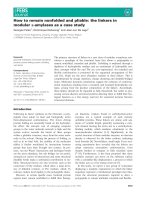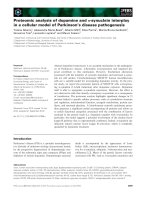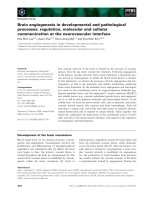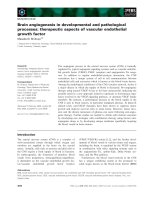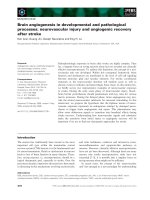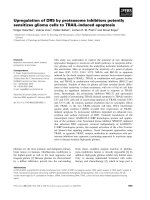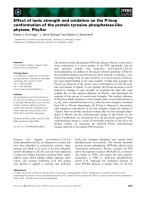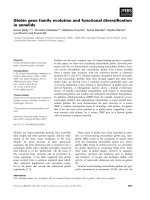Tài liệu Báo cáo khoa học: "Panel on Natural Language and Databases" pot
Bạn đang xem bản rút gọn của tài liệu. Xem và tải ngay bản đầy đủ của tài liệu tại đây (138.78 KB, 2 trang )
Panel on Natural Language and Databases
Daniel P. Flickinger
Computer Research Center
Hewlett-Packard Company
1501 Page Mill Road
Palo Alto, California 94304 USA
While I disagree with the proposition that database
query has outlived its usefulness as a test environment for
natural language processing (for reasons that I give below),
I believe there are other reasonable tasks which can also
spur new research in NL processing. In particular, I will
suggest that the task of providing a natural language inter-
face to a rich programming environment offers a convenient
yet challenging extension of work already being done with
database query.
First I recite some of the merits of continuing research
on natural language within the confines of constructing an
interface for ordinary databases. One advantage is that the
speed of processing is not of overwhelming importance in
this application, since one who requests information from
a database can expect the retrieval to take time, with or
without a natural language interface. Of course speed is
desirable, and waiting for answers to apparently simple re-
quests will be irritating, but some delay will be tolerable.
This tolerance on the part of the user will, I suggest, dis-
appear in applications where an attempt is made to engage
a system in dialogue with the user, as would be the case
in some expert systems, or in teaching systems. Assum-
ing that natural language systems will not by themselves
get faster as they are made to cope with larger fragments
of a natural language, it will be useful to continue with
database query while we wait for miracles of technology to
fill our demands for ever greater processing speed.
A second reason for not yet abandoning the database
query as a test environment is that a great deal of important
natural language processing research remains to be done in
generalizing systems to cope with more than one natural
language. Work on language universals gives reason to be-
lieve that some significant part of a natural language system
for English should be recyclable in constructing a system
for some other language. How much these cross-linguistic
concerns ought to affect the construction of a particular
system is itself one of the questions deserving of atten-
tion, but our experience to date suggests that it pays to
avoid language-particular solutions in an implementation
which aspires to treatment of any sizable fragment of a lan-
guage, even a single language like English. The degree of
language-independence that a natural language system can
boast may also prove to be one useful metric for evaluat-
ing and comparing such systems. [t seems clear that even
the task of answering database queries will provide a more
than adequate supply of linguistically interesting problems
for this line of research.
Finally, it has simply not been our experience at
Hewlett-Packard that there is any shortage of theoretically
interesting problems to solve in constructing a natural lan-
guage interface for databases. For example, in building such
an interface, we have recently designed and implemented a
hierarchically structured lexicon for a fragment of English,
together with a set of lexical rules that can be run either
when loading the system, or when parsing, to greatly ex-
pand the size of the lexicon actually used in the system.
Several questions of theoretical interest that arose in that
process remain unanswered; at least some can be answered
by experimenting with our present system, functioning sim-
ply as an interface to an ordinary relational database.
Having argued that significant work remains to be done
in natural language processing as an interface to databases,
I nonetheless believe that it would be fruitful to expand
the scope of a natural language interface, to permit some
manipulation of a programming environment, allowing not
only the retrieval of information describing the state of the
system, but also some modification of the system via nat-
ural language. Of course, such a task would be facilitated
by having the information about the environment stored in
a manner similar to that of a database, so that our atten-
tion could be devoted to the new range of linguistic issues
raised, rather than to details of how the whole program-
ming environment is structured and maintained. I will not
offer an account of how such a merging of database and
general programming environment might be accomplished,
but instead will offer some motivation for stretching natural
language research in this direction.
It seems clear, first of all, that such an interface would
be useful, given that even a common programming envi-
ronment provides a wide array of tools, not all of which
are familiar to any one user. While it is usually the case
that one who is accustomed to a given facility would be
hampered by having to employ only a natural language in-
terface to accomplish familiar tasks (e.g., imagine typing
"Move down to the beginning of the next line" every time
a carriage-return was required), such an interface would
be invaluable when trying to utilize an unfamiliar part of
the system. A related benefit would be the ability of a
user new to a programming environment to customize that
environment without any detailed knowledge of it. This in-
direct access to the multitude of parameters that determine
the behavior of a complex environment would also be con-
venient for an experienced user attempting to alter some
188
rarely-changed aspect of the environment. Such a natural
language interface might also cope with "how to" questions,
at least serving as another link to on-line documentation.
The linguistically interesting issues that such an ex-
tended interface would raise include a greater need for
some language production capability (where the ordinary
database query system can get by with only language un-
derstanding), and a greater need for some discourse repre
sentation. I suspect that some new syntactic constructions
might also appear, rare in a database application but more
common in programming applications.
Using an extended interface of this kind, some dialogue
between the user and the system would be useful, especially
in cases where a request was too vague, and the system (like
an expert system) could present a series of choice points
to the user in order to reduce the original request to a
manageable one. Presenting these choices would provide
a convenient forum for research in language production,
while suffering the disadvantage mentioned above of forcing
us to worry more about the speed with which the system
performs.
Issues concerning discourse representation could be
studied with this kind of task in a fairly natural way, since
questions about a programming environment would have
to do in part with the changes taking place during a ses-
sion, so that the system would want to keep track of at least
some history of a session, both previous events and previous
discourse. In addition to providing a testbed for discourse
related research, a system like this would also offer a good
setting for study of tense and aspect issues which are not
so readily raised in a simple database query application.
A final advantage of extending a natural language inter-
face to include the programming environment is that if the
interface were being developed in such an environment, one
could use natural language to develop the natural language
system itself, a property that would be not only useful but
also elegant.
189
